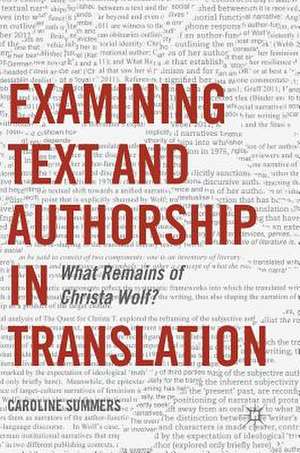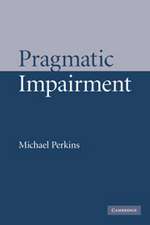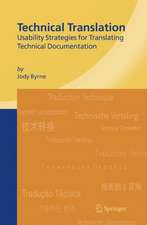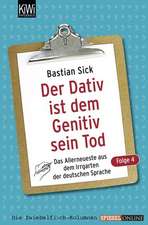Examining Text and Authorship in Translation: What Remains of Christa Wolf?
Autor Caroline Summersen Limba Engleză Hardback – 6 mar 2017
This book, the first in-depth study of authorship in translation, explores how authorial identity is ‘translated’ in the literary text. In a detailed exploration of the writing of East German author Christa Wolf in English translation, it examines how the work of translators, publishers, readers and reviewers reframes the writer’s identity for a new reading public. This detailed study of Wolf, an author with a complex and contested public profile, intervenes in wide-ranging contemporary debates on globalised literary culture by examining how the fragmented identity of the ‘international’ author is contested by different stakeholders in the construction of a world literature. The book is interdisciplinary in its approach, representing new work in Translation Studies and German Studies that is also of interest and relevance to scholars of literature in other languages.
| Toate formatele și edițiile | Preț | Express |
|---|---|---|
| Paperback (1) | 581.01 lei 43-57 zile | |
| Springer International Publishing – 20 iul 2018 | 581.01 lei 43-57 zile | |
| Hardback (1) | 733.15 lei 43-57 zile | |
| Springer International Publishing – 6 mar 2017 | 733.15 lei 43-57 zile |
Preț: 733.15 lei
Preț vechi: 894.09 lei
-18% Nou
Puncte Express: 1100
Preț estimativ în valută:
140.28€ • 146.86$ • 116.08£
140.28€ • 146.86$ • 116.08£
Carte tipărită la comandă
Livrare economică 07-21 aprilie
Preluare comenzi: 021 569.72.76
Specificații
ISBN-13: 9783319401829
ISBN-10: 3319401823
Pagini: 247
Ilustrații: XVII, 260 p. 5 illus., 4 illus. in color.
Dimensiuni: 148 x 210 x 22 mm
Greutate: 0.6 kg
Ediția:1st ed. 2017
Editura: Springer International Publishing
Colecția Palgrave Macmillan
Locul publicării:Cham, Switzerland
ISBN-10: 3319401823
Pagini: 247
Ilustrații: XVII, 260 p. 5 illus., 4 illus. in color.
Dimensiuni: 148 x 210 x 22 mm
Greutate: 0.6 kg
Ediția:1st ed. 2017
Editura: Springer International Publishing
Colecția Palgrave Macmillan
Locul publicării:Cham, Switzerland
Cuprins
1. Introduction: Christa Wolf and the Problem of International Authorship.- 2. Understanding Translated Authorship.- 3. The Subjective Narrator: Nachdenken über Christa T..- 4. The Author as Feminist: Kassandra.-
5. Politics, Morality and Aesthetics: Two Translations of Was bleibt.- 6. Conclusion: What Remains? The Quest for Christa Wolf
Notă biografică
Caroline Summers is Lecturer in Comparative Literary Translation at the University of Leeds, UK. Her research focuses on the literary text as an object of cultural exchange and on the construction of authorial identities through literary translation, especially the status of the text as a point of intersection between the activities of different agents in the translation process.
Textul de pe ultima copertă
This book, the first in-depth study of authorship in translation, explores how authorial identity is ‘translated’ in the literary text. In a detailed exploration of the writing of East German author Christa Wolf in English translation, it examines how the work of translators, publishers, readers and reviewers reframes the writer’s identity for a new reading public. This detailed study of Wolf, an author with a complex and contested public profile, intervenes in wide-ranging contemporary debates on globalised literary culture by examining how the fragmented identity of the ‘international’ author is contested by different stakeholders in the construction of a world literature. The book is interdisciplinary in its approach, representing new work in Translation Studies and German Studies that is also of interest and relevance to scholars of literature in other languages.
Caracteristici
Systematically examines authorship in translation by focusing on Christa Wolf Engages with growing trends in research into agents of translation and cultural transfer, looking at the process of translation on levels outside the text Intervenes in wide-ranging contemporary debates on globalised literary culture by examining how the fragmented identity of the ‘international’ author is contested by different stakeholders in the construction of a world literature












